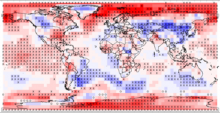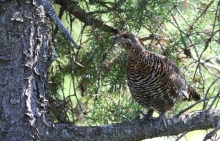A new method for projecting how the temperature will respond to human impacts supports the outlook for substantial global warming throughout this century – but also indicates that, in many regions, warming patterns are likely to vary significantly from those estimated by widely used computer models.


A team of researchers believe that Quebec’s protected areas are poised to become biodiversity refuges of continental importance. They used ecological niche modeling to calculate potential changes in the presence of 529 species in about 1/3 of the protected areas in southern Quebec almost all of which were under 50 km2 in size. Their results suggest that fifty - eighty years from now (between 2071–2100) close to half of the protected regions of southern Quebec may see a species turnover of greater than 80 %.
Vijaya Raghavan, Professor, McGill University, which is one of the collaborators of the project, said that promoting the consumption of small millets was not only key for addressing malnutrition related issues, but also to address climate change.
Vijaya Raghavan, Professor, McGill University, which is one of the collaborators of the project, said that promoting the consumption of small millets was not only key for addressing malnutrition related issues, but also to address climate change.
The Hindu

Scientists at an international conference said on [November 30] that climate change was a global phenomenon that could only be controlled by planting more and more trees. This was stated in the concluding session of the first international conference on Conventional and Modern Approaches in Plant Sciences (CMAPS 17), organised by the Punjab University Department of Botany at Faisal Auditorium. [...] Dr Danielle Donnelly from McGill University Canada, [...] Dr Jaswinder Singh from McGill University Canada, [...] attended the event.

New research by McGill University biologists shows that milder winters have led to physical alterations in two species of mice in southern Quebec in the past 50 years – providing a textbook example of the consequences of climate change for small mammals.
The findings also reveal a stark reversal in the proportions of the two mice populations present in the area, adding to evidence that warming temperatures are driving wildlife north.

Early flowering, early fruiting: Anecdotal evidence of climate change is popping up as quickly as spring crocuses, but is it coincidence or confirmation that plants’ timing is shifting in response to warming temperatures?
Suzanne King, Department of Psychiatry, McGill University and Douglas Institute
She can talk about the importance of keeping pregnant women away from stress, for themselves and their baby. Professor King is a specialist in prenatal maternal stress. She began the Iowa Flood Study right after major flooding in this US state in June 2008. Her group added disaster questionnaires to an existing study of pregnant women for whom mental health data had been collected prior to the flooding.

Ecosystems are a complex web of interactions. These ecological networks are being reorganized by extinctions and colonization events caused by human impacts, such as climate change and habitat destruction. In a paper published this week in Nature Ecology & Evolution, researchers from McGill University and University of British Columbia have developed a new theory to understand how complex ecological networks will reorganize in the future.

Canada’s Minister of Environment and Climate Change, the Honourable Catherine McKenna announced a $50,000 grant from Natural Resources Canada’s Program for Energy Research and Development (PERD) to help TeamMTL participate in the international Solar Decathlon, to be held next year in Dezhou, China.
Congratulations to M.Sc. candidate Émile Brisson-Curadeau (Supervisor: Prof. Kyle Elliott, NRS) for capturing second place in "NSERC -" Science, action!" competition contest for "La sentinelle des mers".
ABOUT ÉMILE

One of the big mysteries in the scientific world is how the ice sheets of Antarctica formed so rapidly about 34 million years ago, at the boundary between the Eocene and Oligocene epochs.
There are 2 competing theories:
The first explanation is based on global climate change: Scientists have shown that atmospheric carbon dioxide levels declined steadily since the beginning of the Cenozoic Era, 66 million years ago. Once CO2 dropped below a critical threshold, cooler global temperatures allowed the ice sheets of Antarctica to form.

Institut nordique du Québec (INQ)’s founding partners have unveiled the first foundational elements of the Institute’s scientific program by simultaneously announcing three northern research chairs and introducing its newly recruited director of science and innovation, Louis Fortier.
Representatives from INQ’s three founding universities made a joint announcement of funding for three research chairs supported by INQ, allocated to INRS, McGill University, and Université Laval—a historic first for northern research.

Traveling and harvesting on the land and sea is of vital importance to Indigenous communities in the Canadian Arctic and subarctic, with links to food security, cultural identity, and wellbeing. A new study by the Climate Change Adaptation Research Group at McGill University however, finds that economic transitions, social shifts, and climate change are dramatically affecting the safety of Inuit during these activities.


With global temperatures continuing to rise at an alarming rate, predictions for the impact of climate change on plants and wildlife must improve to give scientists a clearer picture of which species are most at risk of extinction.
